Bill Russell dies at 88: Sporting world pays tribute to basketball's greatest winner
CGTN
Basketball
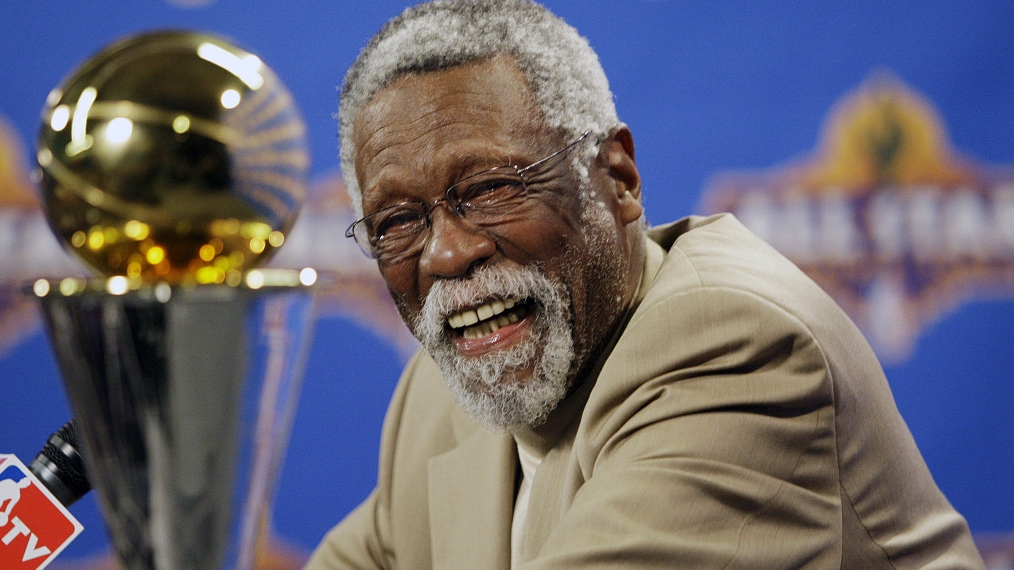
NBA great Bill Russell reacts at a news conference as he learns the Most Valuable Player award for the NBA basketball championships has been renamed the Bill Russell NBA Finals Most Valuable Player Award, February 14, 2009. /CFP
Icon. Legend. Trailblazer. There is no formidable winner in basketball than Bill Russell.
The American hero won 11 NBA titles, two NCAA championships and an Olympic gold medal. To put his trophy-laden career into context, Michael Jordan only won six NBA championships, an NCAA title and two Olympic golds.
"Success is a result of consistent practice of winning skills and actions," Russell once famously declared. "There is nothing miraculous about the process. There is no luck involved."
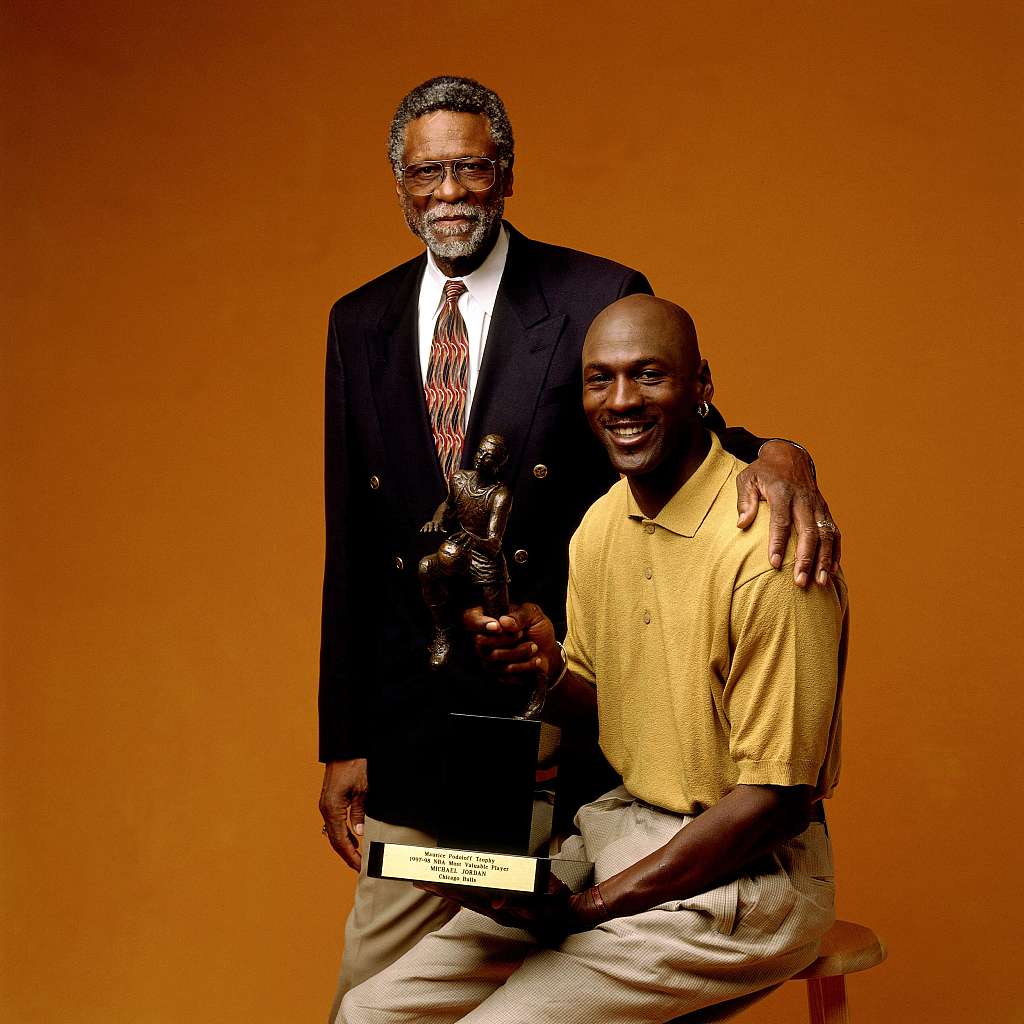
Michael Jordan (R) poses for a portrait with NBA Legend Bill Russell in Chicago, U.S., May 18, 1998. /CFP
A five-time Most Valuable Player, 12-time All-Star and the Presidential Medal of Freedom winner, Russell's achievement go beyond numbers. During his 13-year career, he not only served as the cornerstone of a Boston Celtics dynasty, but also left a lasting mark as an African American athlete.
A leading voice for social justice, Russell single-handedly changed the course of American sports history by becoming its first Black coach in 1966 and the first Black player inducted into the Basketball Hall of Fame in 1975.
It is little wonder thus that after news of Russell's death broke on Sunday, the sporting world and beyond have come together to pay tribute to one of the most important basketball players of all time.
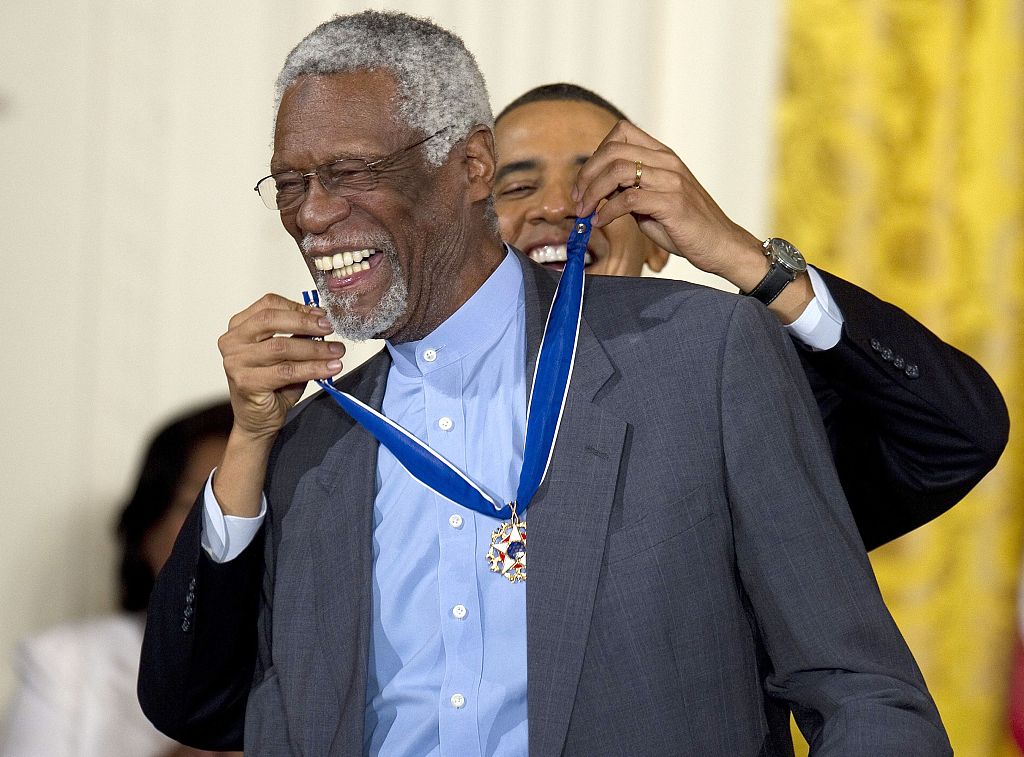
U.S. President Barack Obama awards the Medal of Freedom to Bill Russell during a ceremony at the White House in Washington, U.S., February 14, 2011. /CFP
Jordan led the way by saying Russell was a "pioneer." "He paved the way and set an example for every Black player who came into the league after him, including me," Jordan said in a statement. "The world has lost a legend."
Boston's former "Big Three" of Paul Pierce, Kevin Garnett and Ray Allen all posted emotional messages on social media. "I can go on all day about what you meant to me," said Pierce. "I'll never forget this day we were like kids sitting around a camp fire listening to your stories."
Lakers great Magic Johnson, another legendary Hall of Famer, added, "Bill Russell was my idol... Despite all of his achievements, he was so humble, a gentle giant, a very intelligent man, and used his voice and platform to fight for Black people."
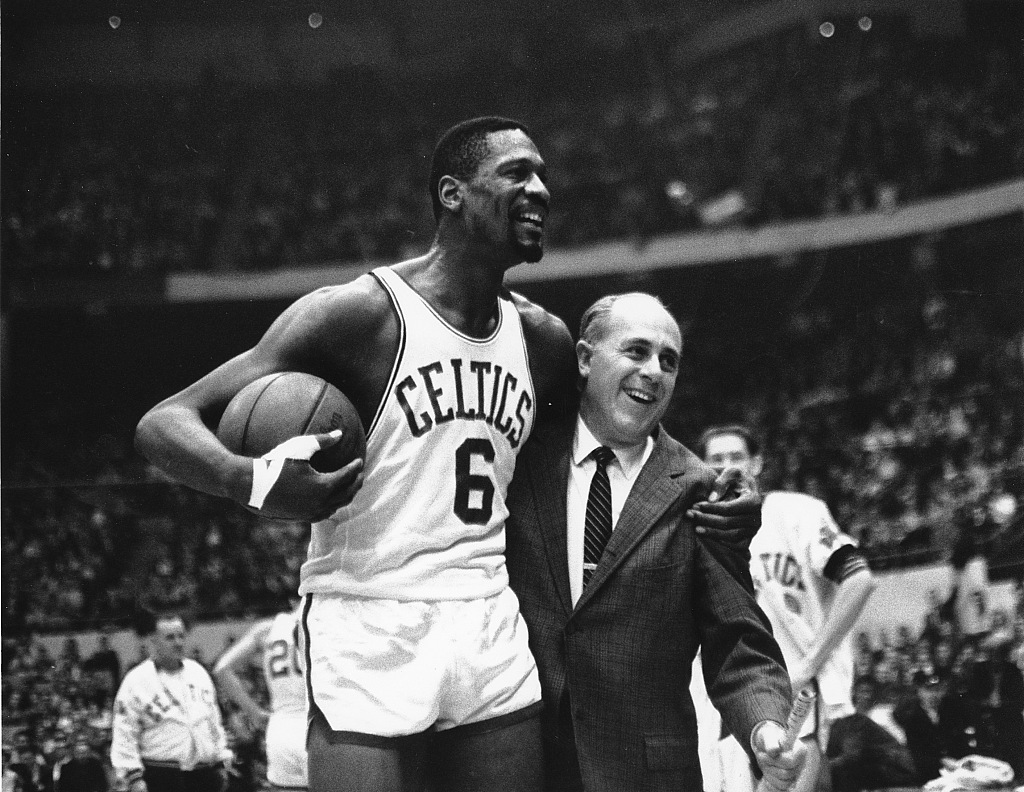
Bill Russell (L) is congratulated by Celtics coach Arnold Auerbach after scoring his 10,000th point in the NBA game against the Baltimore Bullets in Boston Garden, U.S., December 12, 1964. /CFP
"He was one of the first athletes on the frontline fighting for social justice, equity, equality, and civil rights. Over the course of our friendship, he always reminded me about making things better in the Black community."
The comment was echoed by NBA Commissioner Adam Silver, who stressed that his eulogy "only begin to tell the story of Bill's immense impact on our league and broader society."
"Bill stood for something much bigger than sports: the values of equality, respect and inclusion that he stamped into the DNA of our league," Silver said.
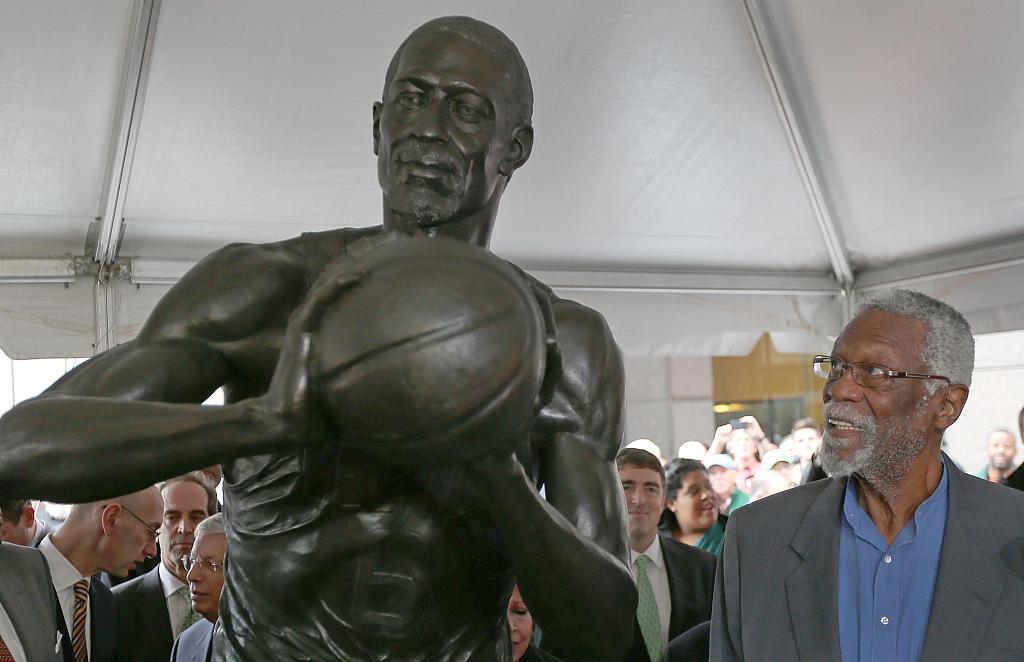
Celtics great Bill Russell looks at his statue on Boston's City Hall Plaza, U.S., November 1, 2013. /CFP
There's almost no way to measure the huge impact Russell had on basketball and society as a whole, and U.S. President Joe Biden highlighted Russell's ability to force everybody "to confront hard truths."
"The promise of America is that we are all created equal and deserve to be treated equally throughout our lives. We've never fully lived up to that promise, but Bill Russell made sure we never walked away from it," Biden said in a statement.
"And on this day, there are generations of Americans who are reflecting on what he meant to them as someone who played for the essential truth that every person is entitled to be treated with dignity and respect."
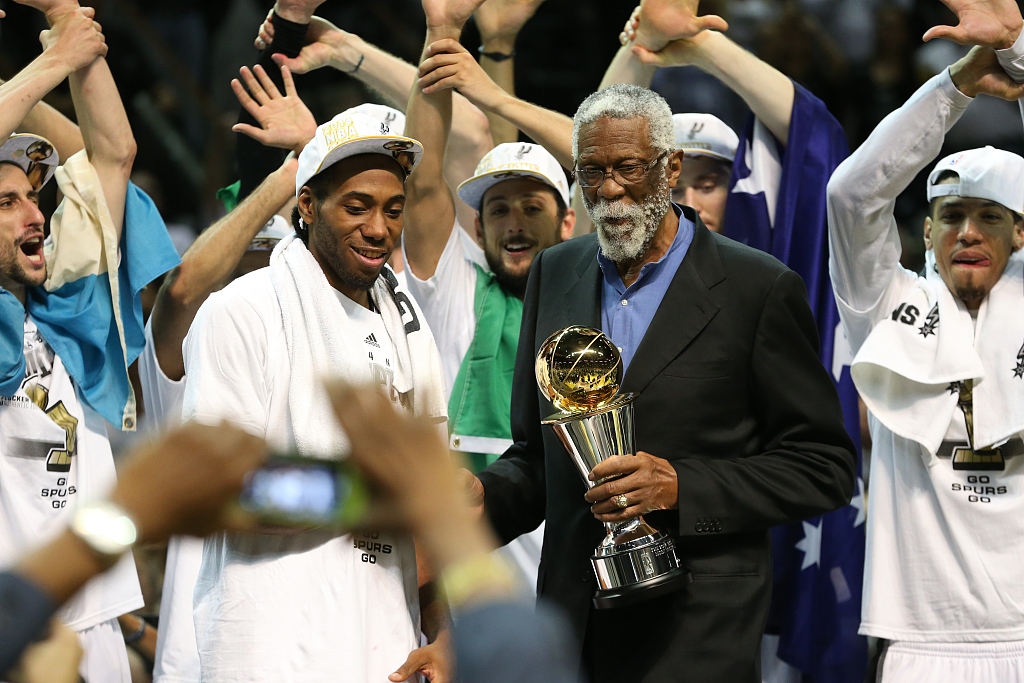
Bill Russell holds the NBA Finals Most Valuable Player Award at AT&T Center in San Antonio, U.S., June 15, 2014. /CFP
Former U.S. President Barack Obama, who awarded Russell the Presidential Medal of Freedom, also paid his tribute, saying the world had "lost a giant."
"Perhaps more than anyone else, Bill knew what it took to win and what it took to lead. On the court, he was the greatest champion in basketball history. Off of it, he was a civil rights trailblazer, marching with Dr. King and standing with Muhammad Ali," Obama wrote on Twitter.
"For decades, Bill endured insults and vandalism, but never let it stop him from speaking up for what's right. I learned so much from the way he played, the way he coached, and the way he lived his life."
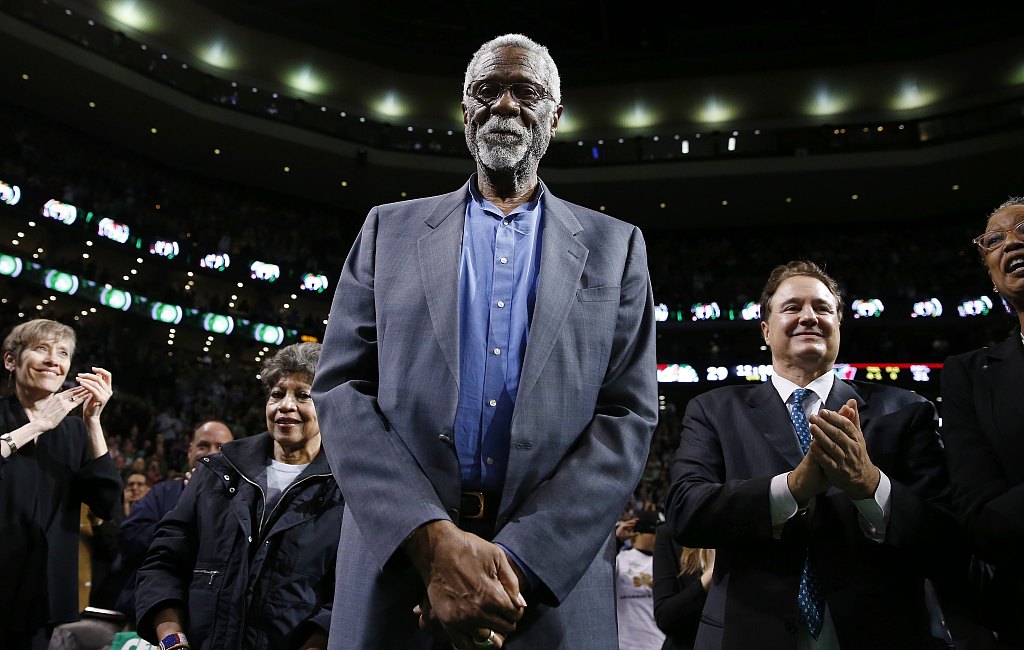
Bill Russell stands court side during a tribute in his honor in the second quarter of an NBA basketball game against the Milwaukee Bucks in Boston, U.S., November 1, 2013. /CFP
Bill Russell Key Numbers
5
Russell was NBA's Most Valuable Player five times, tying Michael Jordan and beaten only by Kareem Abdul-Jabbar, who won the award six times.
11
Russell holds the record for the most NBA championships won with 11 titles during his 13-year career, including eight straight titles from 1959-1966. He also served as a player-coach of the Celtics for his final two titles in 1968 and 1969.
12
Russell made the All-Star team 12 times. He was named MVP of the All-Star Game in 1963 after notching up 19 points, 24 rebounds and five assists.
22.45
Russell averaged 22.5 rebounds per game for his career, taking up the number two spot on the all-time list. He and Wilt Chamberlain are the only NBA players in history to average more than 15 rebounds per game in the playoffs.
31 Jul, 2022
Bill Russell redefined how basketball is played, and then he changed the way sports are viewed in a racially divided country.
The most prolific winner in NBA history, Russell marched with Martin Luther King Jr, stood with Muhammad Ali and received the Presidential Medal of Freedom from President Barack Obama. The centrepiece of the Boston Celtics dynasty that won 11 championships in 13 years, Russell earned his last two NBA titles as a player-coach — the first Black coach in any major US sport.
Russell died Sunday at the age of 88, with his wife, Jeannine, at his side, his family said in a statement posted on social media. No cause of death was immediately available; Russell, who had been living in the Seattle area, was not well enough to present the NBA Finals MVP trophy in June due to a long illness.
"We hope each of us can find a new way to act or speak up with Bill's uncompromising, dignified and always constructive commitment to principle," the family said. "That would be one last, and lasting, win for our beloved #6."
A Hall of Famer, five-time Most Valuable Player and 12-time All-Star, Russell in 1980 was voted the greatest player in NBA history by basketball writers. He remains the sport's most decorated champion — he also won two college titles and an Olympic gold medal — and an archetype of selflessness who won with defence and rebounding while others racked up gaudy scoring totals.
Often, that meant Wilt Chamberlain, the only worthy rival of Russell's era and his prime competition for rebounds, MVP trophies and barroom arguments about who was better. Chamberlain, who died in 1999 at 63, had twice as many points, four MVP trophies of his own and is the only person in league history to grab more rebounds than Russell — 23,924 to 21,620.
/cloudfront-ap-southeast-2.images.arcpublishing.com/nzme/TVBCDAI3FANRB3W3MXMKDZ4YLM.jpg)
But Russell dominated in the only stat he cared about: 11 championships to two.
"Bill Russell was the greatest champion in all of team sports," NBA Commissioner Adam Silver said. More importantly, he added: "Bill stood for something much bigger than sports: the values of equality, respect and inclusion that he stamped into the DNA of our league."
In a statement released by the White House, President Joe Biden praised Russell for his lifelong work in civil rights as well as in sports, and called him "a towering champion for freedom, equality, and justice."
"Bill Russell is one of the greatest athletes in our history - an all-time champion of champions, and a good man and great American who did everything he could to deliver the promise of America for all Americans," Biden said.
Reaction poured in Sunday, from Obama to Michael Jordan, from Magic Johnson to Boston's Mayor, Michelle Wu.
"Today, we lost a giant," Obama said. "As tall as Bill Russell stood, his legacy rises far higher — both as a player and as a person. Perhaps more than anyone else, Bill knew what it took to win and what it took to lead.".
A Louisiana native, Russell also left a lasting mark as a Black athlete in a city — and country — where race is often a flash point. He was at the March on Washington in 1963, when King gave his "I Have a Dream" speech, and he backed Ali when the boxer was pilloried for refusing induction into the military draft.
In 2011, Obama awarded Russell the Medal of Freedom alongside Congressman John Lewis, billionaire investor Warren Buffett, then-German Chancellor Angela Merkel and baseball great Stan Musial.
/cloudfront-ap-southeast-2.images.arcpublishing.com/nzme/I6AQTMXVQ23ZZQM4YJIMGK2QAM.jpg)
"To be the greatest champion in your sport, to revolutionise the way the game is played, and to be a societal leader all at once seems unthinkable," the Celtics said on Sunday. "But that is who Bill Russell was."
Russell said that when he was growing up in the segregated South and later California his parents instilled in him the calm confidence that allowed him to brush off racist taunts.
"Years later, people asked me what I had to go through," Russell said in 2008. "Unfortunately, or fortunately, I've never been through anything. From my first moment of being alive was the notion that my mother and father loved me." It was Russell's mother who would tell him to disregard comments from those who might see him playing in the yard.
"Whatever they say, good or bad, they don't know you," he recalled her saying. "They're wrestling with their own demons."
But it was Jackie Robinson who gave Russell a road map for dealing with racism in his sport: "Jackie was a hero to us. He always conducted himself as a man. He showed me the way to be a man in professional sports."
The feeling was mutual, Russell learned, when Robinson's widow, Rachel, called and asked him to be a pallbearer at her husband's funeral in 1972.
"She hung the phone up and I asked myself, 'How do you get to be a hero to Jackie Robinson?'" Russell said. "I was so flattered."
William Felton Russell was born on 12 February 1934, in Monroe, Louisiana. He was a child when his family moved to the West Coast, and he went to high school in Oakland, California, and then the University of San Francisco. He led the Dons to NCAA championships in 1955 and 1956 and won a gold medal in 1956 at the Melbourne Olympics in Australia.
Celtics coach and general manager Red Auerbach so coveted Russell that he worked out a trade with the St Louis Hawks for the second pick in the draft. He promised the Rochester Royals, who owned the No. 1 pick, a lucrative visit by the Ice Capades, which were also run by Celtics owner Walter Brown.
Still, Russell arrived in Boston to complaints that he wasn't that good. "People said it was a wasted draft choice, wasted money," he recalled. "They said, 'He's no good. All he can do is block shots and rebound.' And Red said, 'That's enough.'"
The Celtics also picked up Tommy Heinsohn and KC Jones, Russell's college teammate, in the same draft. Although Russell joined the team late because he was leading the US to the Olympic gold, Boston finished the regular season with the league's best record.
The Celtics won the NBA championship — their first of 17 — in a double-overtime seventh game against Bob Pettit's St. Louis Hawks. Russell won his first MVP award the next season, but the Hawks won the title in a finals rematch. The Celtics won it all again in 1959, starting an unprecedented string of eight consecutive NBA crowns.
A 6-foot-10 centre, Russell never averaged more than 18.9 points during his 13 seasons, each year producing more rebounds than points. For 10 seasons he averaged more than 20 rebounds. He once had 51 rebounds in a game; Chamberlain holds the record with 55.
Auerbach retired after winning the 1966 title, and Russell became the player-coach — the first Black head coach in NBA history, and almost a decade before Frank Robinson took over Cleveland in baseball's American League. Boston's title streak ended with a loss to Chamberlain and the Philadelphia 76ers in the Eastern Division finals.
Russell led the Celtics back to titles in 1968 and '69, each time winning seven-game playoff series against Chamberlain. Russell retired after the '69 finals, returning for a relatively successful — but unfulfilling — four-year stint as coach and GM of the Seattle SuperSonics and a less fruitful half-season as coach of the Sacramento Kings.
Russell's No. 6 jersey was retired by the Celtics in 1972. He earned spots on the NBA's 25th anniversary all-time team in 1970, 35th anniversary team in 1980 and 75th anniversary team. In 1996, he was hailed as one of the NBA's 50 greatest players.
In 2009, the MVP trophy of the NBA Finals was named in his honour. (Russell never won the honour, because it was awarded for the first time in 1969.) He presented his namesake trophy for many years, the last in 2019 to Kawhi Leonard; Russell was not there in 2020 because of the NBA bubble nor in 2021 due to COVID-19 concerns.
In 2013, a statue was unveiled on Boston's City Hall Plaza of Russell surrounded by blocks of granite with quotes on leadership and character. Russell was inducted into the Basketball Hall of Fame in 1975 but did not attend the ceremony, saying he should not have been the first African American elected. (Chuck Cooper, the NBA's first Black player, was his choice.)
In 2019, Russell accepted his Hall of Fame ring in a private gathering.
"I felt others before me should have had that honor," he tweeted. "Good to see progress."
But to Jordan, Russell stood alone.
"Bill Russell was a pioneer — as a player, as a champion, as the NBA's first Black head coach and as an activist," the former Chicago Bulls star and current Charlotte Hornets majority owner said. "He paved the way and set an example for every Black player who came into the league after him, including me. The world has lost a legend."
Russell's family said arrangements for the memorial service will be announced in the coming days.
No comments:
Post a Comment